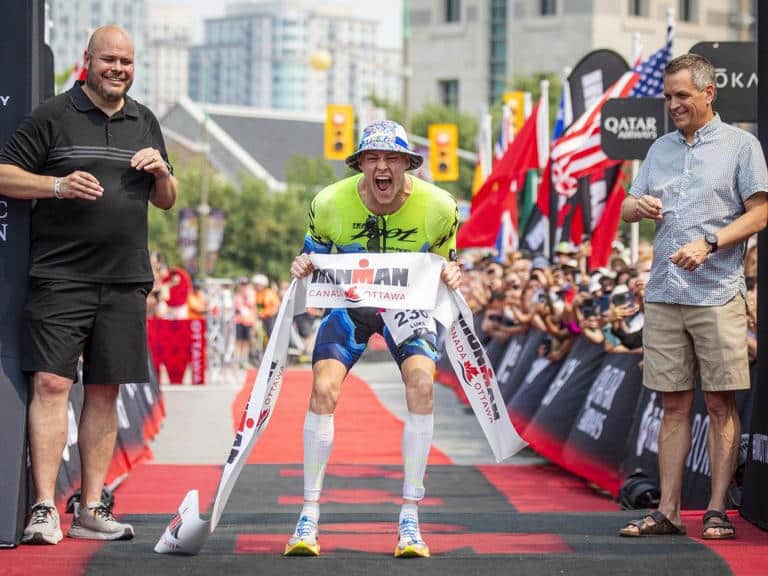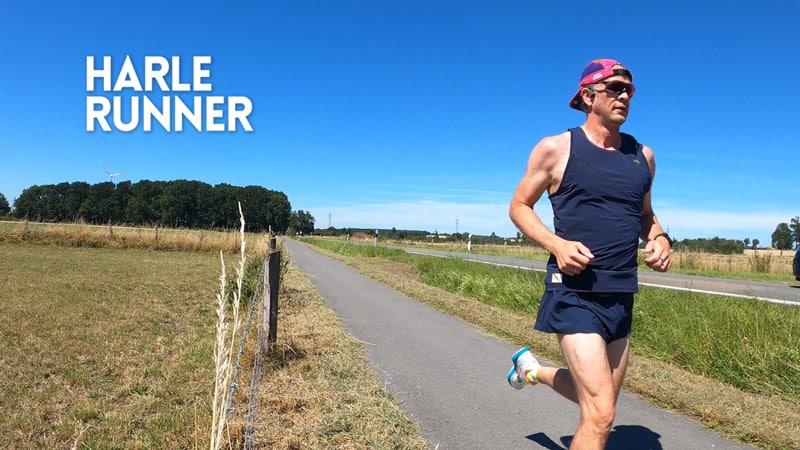Race start with Coach Paul Laursen & Kyle Buckingham—performance begins in the mind; training proves it.
The lesson from a mentor
I first learned this from my mentor Dr David T Martin at the Australian Institute of Sport. David would quiz me on critical core temperature values, VO₂max and lactate curves, then quietly remind me:
“All that matters naught if an athlete doesn’t believe.”
Those words stayed with me through every lab test and training camp—and they’re echoed in a favourite podcast I often share with my students.
Hearing it again from John Kiely
Years later, I sat down with Prof John Kiely on the Training Science Podcast. John dismantled rigid periodisation models and pointed to the same invisible lever: conviction. Athletes who trust the plan produce better outcomes—part placebo, part liberation of intent (Beedie, 2007).
The science behind the “belief effect”
Placebo research shows why. Tell golfers they’re putting with a pro’s club and their performance jumps sharply—no swing tweaks required. Sport-scientists confirm that confidence alone can amplify training adaptations and pain tolerance.
That’s the belief effect: physiology wrapped in psychology, unlocked by a coach’s words.
Translating coaching magic into code
When we built Athletica’s new AI-Coach Race-Week Countdown, my mandate to the team was simple: bottle those finish-line whispers and deliver them—at scale, every day of taper week. Where static plans give you a script; Athletica’s AI-Coach gives you a conversation that changes with every day closer to go time.
How the Countdown works
| Day | Core message | Mindset cue |
| -6 (Mon) | Shift to the mind | 5-min breath session |
| -5 (Tue) | Control the controllables | Visualise race-morning flow |
| -4 (Wed) | The plan is the anchor | “Hay’s in the barn” mantra |
| -3 (Thu) | Primed, not tired | Openers: pop, don’t push |
| -2 (Fri) | Trust & settle | List gratitudes |
| -1 (Sat) | Race-eve calm | Full visualisation, then release |
| Race day | Be present, execute | “Smile when it hurts” |
Messages adapt to sport, race day, and your own training logs—like a coach who remembers the brutal long ride you nailed two weeks ago.
Hear the full race-week mindset chat
*Paul Laursen, Marjaana Rakai & Paul Warloski unpack taper nerves, travel tricks, pacing mistakes, and mindset hacks. Perfect listen while you’re foam-rolling.*
| Timestamp | Key moment & pull-quote |
| 0:05 | Gratitude sets the tone — “Remember you’re privileged to toe the line; discomfort is still a blessing.” |
| 1:08 | Why race-week is the overlooked phase of performance — intro frames taper, travel, gear, sleep, nerves. |
| 2:12 | Negative self-talk spikes when mileage drops — idle time → doubts; coach’s job is to redirect. |
| 3:26 | Paul’s mantra: “The most important muscle now is the one between your ears.” |
| 4:49 | Visualisation + breathwork toolbox — box-breathing demo for vagus-nerve calm. |
| 6:56 | Silken Laumann comeback story — mind-over-matter case study for belief. |
| 9:52 | Over-visualisation warning — too much hype = tension; match imagery to personality type. |
| 12:49 | No new gear or nutrition on race day — checklist culture saves disasters. |
| 17:03 | Pacing ego trap — starting at half-marathon pace in a full Ironman leads to walking. |
| 19:45 | Sleep truth-bomb — “The night before doesn’t matter; bank sleep 5–6 days out.” |
| 24:26 | Volume ↓, intensity ↔ — classic taper formula explained. |
| 26:05 | Final wrap-up — gratitude, smile through pain, support others on course. |
A coach’s closing advice
- Keep a victory log. Re-read your best sessions every night of taper week—evidence beats doubt.
- Control the small stuff. Packed bags and printed schedules create mental space to compete.
- Practice realistic imagery. Feel the wind, the heat, the burn, the crowd noise—then see yourself respond.
- Use gratitude as a valve. Nothing calms sympathetic overload faster than writing what you’re thankful for.
- Debrief within 48 h. Capture lessons while emotions are vivid; they’ll feed the next belief loop.
The muscle that matters most now? The one between your ears. Whether you’re an Ironman pro or lacing up for your first 10 k, belief is the final performance enhancer still available in race week.
Ready to turn nerves into conviction? Try Athletica free and let the AI-Coach guide your race-week mindset.
14-day free trial. No credit card required.
FAQs
- What is a taper week and why is it critical before a race?
A taper week is the final 6–8 days before race day when overall training volume drops sharply and recovery increases. Cutting load lets muscle damage repair, energy stores refill, and—most importantly—confidence surge, so you reach the start line fresh instead of fatigued. - How much should I cut my mileage during taper week?
Most athletes reduce total volume by 35–50 percent. Athletica’s race-taper plan AI fine-tunes that range daily using your training history, HRV, and recent workload—so you won’t see a one-size-fits-all number. - Should I still do speed work the week before a race?
Yes. Keep one or two short “primers” such as 3 × 2 minutes at race pace. These sharpen neuromuscular readiness without adding fatigue. Athletica schedules these for you. - How many rest days should I take in the week before a marathon?
Plan on one to two total rest or very easy days. The key this week is to protect race-day freshness. - What should I eat during taper week to maximise performance?
Prioritise nutritious whole food meals, keep protein steady for muscle repair, stay hydrated, and avoid trying brand-new supplements. “Nothing new in race week” is still a golden rule. - How do I calm race-week nerves and anxiety?
Use evidence-based tools: five-minute box-breathing, a brief gratitude journal, and a single, realistic visualisation of your pacing strategy. Athletica’s Countdown messages cue these daily, shifting focus from fear to process. - Can an AI coach guide my taper if my recovery scores are low?
Absolutely. Athletica ingests HRV, resting heart rate, and sleep each morning. If recovery is suppressed, it prompts you to prioritize easy training—or full rest—and sends a mindset prompt so you stay confident in the plan. - How long should my last long session be before taper week?
This depends on your sport and your event distance. In general, your final long session should be 8–10 days before the race. This timing keeps endurance adaptations “hot” while giving your legs ample time to recover before taper really kicks in. - Does sleep matter more than extra training in race week?
Yes. Banking eight or more hours of sleep for five to six nights before the race has a bigger impact on performance than squeezing in another workout. The night before the race counts least; focus on consistent sleep the entire week as best you can. - What mistakes should I avoid in the final week before a race?
Starting workouts too fast, trying new shoes or nutrition, booking tight travel that adds stress, skipping meals to “stay light,” and obsessively re-checking splits instead of trusting the taper plan are the classic pitfalls to dodge.
14-day free trial. No credit card required.








